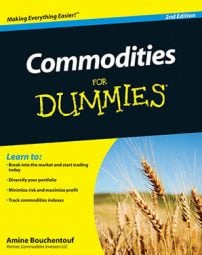In finance, leverage refers to the act of magnifying returns in the commodities markets through the use of borrowed capital. Leverage is a powerful tool that gives you the opportunity to control large market positions with relatively little upfront capital. However, leverage is the ultimate double-edged sword because both your profits and losses are magnified to outrageous proportions.
If you invest in stocks, you know that you’re able to trade on margin. You have to qualify for a margin account, but when you do, you’re able to use leverage (margin) to get into stock positions. You can also trade commodities on margin.
The biggest difference between using margin with stocks and using margin with commodities is that margin requirement for commodities is much lower than margins for stocks, which means the potential for losses (and profits) is much greater in commodities.
If you qualify for trading stocks on margin, you need to have at least 50 percent of the capital in your account before you can enter into a stock position on margin.
The minimum margin requirements for commodity futures vary but, on average, are lower than those for stocks. For example, the margin requirement for soybeans in the Chicago Board of Trade is 4 percent. This means that, with only $400 in your account, you can buy $10,000 worth of soybeans futures contracts!
If the trade goes your way, you’re a happy camper. But if you’re on the losing side of a trade on margin, you can lose much more than your principal.
Another big difference between stock and commodity futures accounts is that the balance on futures accounts is calculated at the end of the trading session. So if you get a margin call, you need to take care of it immediately.
When you’re trading on margin, which is essentially trading on borrowed capital, you may get a margin call from your broker requiring you to deposit additional capital in your account to cover the borrowed amount.
Because of the use of margin and the extraordinary amounts of leverage you have at your disposal in the futures markets, you need to be extremely careful when trading commodity futures contracts. To be a responsible investor, you should use margin only if you have the necessary capital reserves to cover any subsequent margin calls you may receive if the market moves adversely.

